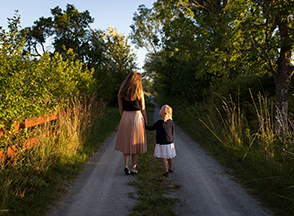Ways to Protect Children After a Marriage Ends
Home / Divorce & Remarriage / Divorcing with Mutual Respect

Approximately one million American kids go through a divorce every year. While the end of a marriage is something many children will experience, it can often be stressful, scary, and confusing for kids. Studies suggest that some will struggle after a split, with higher rates of depression, anxiety, and acting out. Problems in school or with friends may emerge. The financial difficulties that come along with divorce for many families create their own challenges.
However, there is also good news. Plenty of children do quite well following a divorce, especially if the marriage that ended was high-conflict. And the most noticeable effects often fade out after a couple of years. What’s more, kids vary a great deal in how they respond. What makes the difference?
In fact, researchers have identified a few consistent factors that can help protect kids who go through a divorce. It may help parents to learn what they are.
Factors That Help Kids Cope with Divorce
Children and teens who experience the following are more likely to handle divorce well:
- Parents who use an “authoritative” parenting style (neither too permissive nor too strict)
- A strong support network outside the family, such as grandparents, family friends, etc.
- Good relationships between the child and parents
- Being shielded from fighting between parents
- A stable and structured routine
- Understanding what did and didn’t cause the divorce
- Participation in an evidence-based support program
How Programs for Kids Can Assist
Although almost half of the counties in the country require divorcing parents to take some kind of class to help them through the experience, far fewer areas offer programs for kids. This is too bad, because research-backed programs for kids who are going through this experience may really help. If you can locate a program like this in your area, it can definitely be worth your family’s time! One great one is the Children of Divorce Intervention Program, but there are many other options. Here are some things to look for in programs like these, according to experts:
- The group has experienced and compassionate leaders
- Kids in the group are of similar ages
- Children are taught how to identify and express their feelings
- Participants are taught specific coping skills
- The group has guidelines and feels safe
- The group provides help to parents, too
You might find a group like this through school, the legal system, your religion or faith, a counselor, or a community organization.
In order to handle the change, strong emotions, and upheaval that come along with a divorce, children need resilience, support, and strong coping skills. Parents and family can help children with much of this, but at times you may need assistance from others.
Free Help with Stepparenting
If your children have been through a divorce and now are living in a new stepfamily, there are additional challenges, both for parents and kids. The SMART Couples project is offering Smart Steps, a FREE, research-backed stepfamily education class taught by trained instructors, in 5 Florida counties. Sign up today!
By Carol Church, lead writer, SMART Couples, Department of Family, Youth and Community Sciences, University of Florida
References
Pedro-Carroll, J. (2005). Fostering children’s resilience in the aftermath of divorce: The role of evidence-based programs for children. Family Court Review, 43, 52-64.
Return to Topic: Divorcing with Mutual Respect


